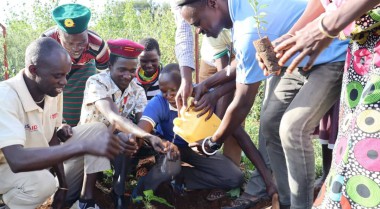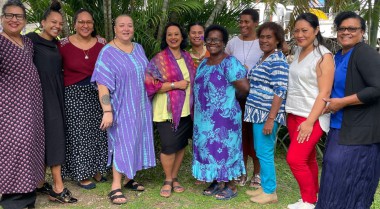
Statement for the upcoming informal plenary meeting of the General Assembly on the existential threats of sea-level rise amidst the climate crisis
Excellencies, Ladies and Gentlemen,
The Pacific is recognised as one of the most vulnerable regions to the consequences of the global climate crisis. Apart from the direct threat to people’s survival, loss of land and community identity due to sea-level rise, the Pacific Island states are among the most vulnerable to other consequences of the climate crisis, including environmental disasters, intense variations in temperatures, and extreme storms. At the same time, the region is vulnerable to catastrophic events, such as volcano eruptions and tsunamis, that exacerbate climate change effects.
The impact of climate change in the Pacific and in other regions demonstrates how the security of humanity is no longer a question of mere military defence. Following the framework developed by the Pacific Leaders in the 2018 Boe Declaration on Regional Security and the 2025 Blue Pacific Strategy, and the Pacific Platform for Action for Gender Equality & Women’s Rights, the GPPAC and PWMN endorse the definition of human security approved by the UN General Assembly, that ‘identif[ies] and address[es] widespread and cross-cutting challenges to the survival, livelihood and dignity of [the] people’ (A/RES/66/290, OP3) and ‘calls for people-centred, comprehensive, context-specific and prevention-oriented responses that strengthen the protection and empowerment of all people and all communities’ (A/RES/66/290, OP3(b)). As women are the first respondents to the crises within their community, we also propose a gender-transformative approach to human security that promotes intersectional and coherent strategies that intentionally recognises that all people and all political processes are interconnected.
With a gender-transformative human security approach, we recommend looking at the interlinkages between climate change and peace and security through the perspective of diverse risks faced by the communities, including economic, food, health, environmental, personal, community, and political risks. These risks often result in sociopolitical tensions, social dissolution, displacement, harmful gender norms, and high levels of violence. Practically, women-led assessments across the Pacific revealed that, in the context of ongoing intersecting crises, women cannot afford to feed their children; people with disabilities receive little support. We recognise the vital role of women as custodians of natural resources and producers of cultural craft as well as fisherwomen. The loss of vital economic resources fuels family economic insecurities, fuelling domestic violence, as well as community violence in several Pacific Island countries. Without a comprehensive and gender-sensitive response, these factors have the potential to negatively impact the stability and security of the local communities and roll back peacebuilding gains.
We promote a nexus approach to addressing climate change in the Pacific. This requires promoting climate-sensitive peacebuilding action: a peacebuilding action that considers the implications of climate change in conflict and stability and integrates it in the analysis and responses. It also requires promoting a conflict-sensitive climate action: climate adaptation and mitigation actions that systematically integrates conflict analysis and prioritise, or at least don’t forget, conflict-affected settings.
From the peace and security standpoint, we align ourselves with the statements of the Pacific Member States to the UN Security Council, suggesting that, in the context of the Pacific, climate change should be considered a peace and security issue. We have ‘mounting evidence of how climate change increases instability and insecurity’ (S/PV.8451, p. 10) and ‘the dangers that small islands and their populations face are no less serious than those faced by nations and peoples threatened by guns and bombs’ (S/PV.5663, pp. 28-29). Adequate support from peace and security partners is due.
Some concrete recommendations include 1) the deployment of dedicated staff, such as the Climate Security Advisors in all UN Country Teams, financially supported from the core budget and the appointment of a special representative of the Secretary-General on climate and security; 2) leveraging existing mechanisms such as the Climate Security Mechanism to identify and leverage solutions in the Pacific; 3) integrating climate data in Early Warning Systems, including led by the Pacific Women Mediators Network, and other data and reporting mechanisms, including regular reporting of the UN Secretary-General to the UNSC and UNGA on Women, Peace and Security, among other existing thematic reports; and 5) encouraging climate-informed mediation, peacebuilding initiatives, and peace operations; among others.
Regarding the PBC, it is crucial that it maintains continued attention to the adverse effects of climate change on peacebuilding and development efforts at the country level and encourages considerations of climate change and climate-related security risks in UN joint analysis, risk assessments, and strategic planning efforts. Moreover, stronger synergies could be consistently built between the PBC and other intergovernmental bodies (i.e., the UNSC, ECOSOC, HRC, etc.) in line with the good practices of ongoing discussion on the interlinkages between climate, peace and developments between the PBC and ECOSOC, while the PBC’s advisory role could be strengthened, especially on possible security implications of climate change in conflict settings.
From the development standpoint, development actors should be in the lead in addressing mitigation and adaptation needs in the Pacific. Understanding that humanitarian, development and peace streams of work are interconnected, we defend a more comprehensive approach that acknowledges the interlinkages and complementarity of the work of development and security partners, recognising the need to strengthen climate finance that would build the foundation for building adaptive capacities within communities.
Overall, action is needed by both peace and security and development partners to address the existential threats of sea-level rise amidst the climate crisis in the Pacific.
Thank You!

